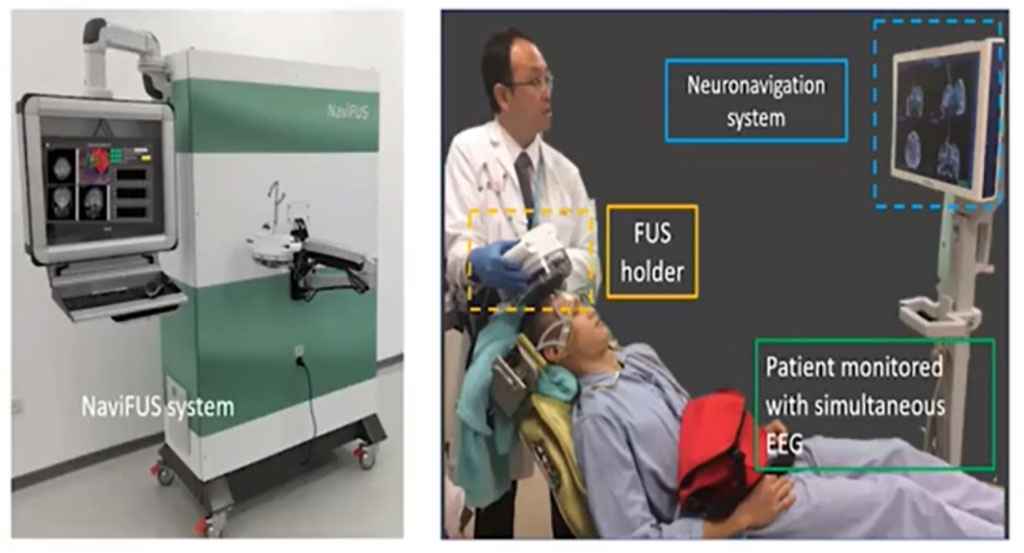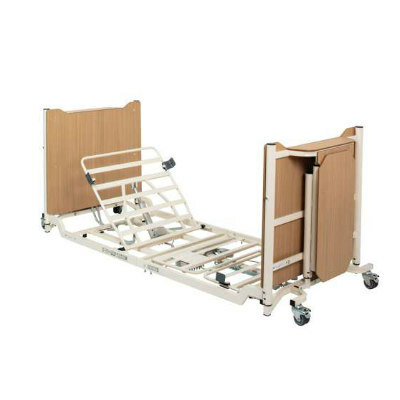Focused Ultrasound May Benefit Patients with Epilepsy
|
By HospiMedica International staff writers Posted on 17 Nov 2021 |

Image: Focused ultrasound being delivered using neuronavigation and EEG monitoring (Photo courtesy of Hsiang-Yu Yu/ VGHTPE)
A new study suggests that focused ultrasound (FUS) of the brain may benefit patients with drug-resistant epilepsy (DRE).
Researchers at National Yang Ming Chiao Tung University (NYCU; Taipei, Taiwan), Taipei Veterans General Hospital (Taiwan), and other institutions conducted a study in six DRE patients who were scheduled to undergo stereo-electroencephalography (SEEG) for localization of the seizure onset zone (SOZ), providing a window of opportunity to investigate the neuromodulatory effects of FUS. Simultaneous SEEG recordings were obtained during sonication and for three days after treatment to monitor seizures, interictal epileptiform discharges, and adverse events.
The results revealed a decrease in seizure frequency in two patients within the three-day follow-up, with significant changes in spectral power of SEEG noted at the targeted electrodes during FUS; one patient showed an increase in the frequency of subclinical seizures. Magnetic resonance imaging (MRI) revealed neither lesion nor brain edema. One patient reported subjective scalp heating during FUS, and one patient developed transient naming and memory impairment that resolved within three weeks. The study was published on November 2, 2021, in Epilepsia.
“Neuromodulation is an alternative treatment for drug-resistant epilepsy. Compared with the present modalities used in neuromodulation for epilepsy, focused ultrasound can access deeper brain regions and focus on the main target of the epileptic network in a relatively less invasive approach,” said senior author Hsiang-Yu Yu, PhD, of VGHTPE and the NYCU Brain Research Center. “It gives new hope and sheds new light for patients with drug-resistant epilepsy.”
Focused ultrasound is based on nonlinear acoustic mathematical optimization methods to analyze and simulate the propagation of sound in material. The information is then used to enhance the shape of an acoustic lens in such a way that that ultrasound pressure is focused precisely on the location of the tissue to be treated, while the surrounding tissue retains as little damage as possible.
Related Links:
National Yang Ming Chiao Tung University
Taipei Veterans General Hospital
Researchers at National Yang Ming Chiao Tung University (NYCU; Taipei, Taiwan), Taipei Veterans General Hospital (Taiwan), and other institutions conducted a study in six DRE patients who were scheduled to undergo stereo-electroencephalography (SEEG) for localization of the seizure onset zone (SOZ), providing a window of opportunity to investigate the neuromodulatory effects of FUS. Simultaneous SEEG recordings were obtained during sonication and for three days after treatment to monitor seizures, interictal epileptiform discharges, and adverse events.
The results revealed a decrease in seizure frequency in two patients within the three-day follow-up, with significant changes in spectral power of SEEG noted at the targeted electrodes during FUS; one patient showed an increase in the frequency of subclinical seizures. Magnetic resonance imaging (MRI) revealed neither lesion nor brain edema. One patient reported subjective scalp heating during FUS, and one patient developed transient naming and memory impairment that resolved within three weeks. The study was published on November 2, 2021, in Epilepsia.
“Neuromodulation is an alternative treatment for drug-resistant epilepsy. Compared with the present modalities used in neuromodulation for epilepsy, focused ultrasound can access deeper brain regions and focus on the main target of the epileptic network in a relatively less invasive approach,” said senior author Hsiang-Yu Yu, PhD, of VGHTPE and the NYCU Brain Research Center. “It gives new hope and sheds new light for patients with drug-resistant epilepsy.”
Focused ultrasound is based on nonlinear acoustic mathematical optimization methods to analyze and simulate the propagation of sound in material. The information is then used to enhance the shape of an acoustic lens in such a way that that ultrasound pressure is focused precisely on the location of the tissue to be treated, while the surrounding tissue retains as little damage as possible.
Related Links:
National Yang Ming Chiao Tung University
Taipei Veterans General Hospital
Latest Patient Care News
- First-Of-Its-Kind Portable Germicidal Light Technology Disinfects High-Touch Clinical Surfaces in Seconds
- Surgical Capacity Optimization Solution Helps Hospitals Boost OR Utilization

- Game-Changing Innovation in Surgical Instrument Sterilization Significantly Improves OR Throughput
- Next Gen ICU Bed to Help Address Complex Critical Care Needs
- Groundbreaking AI-Powered UV-C Disinfection Technology Redefines Infection Control Landscape
- Clean Hospitals Can Reduce Antibiotic Resistance, Save Lives
- Smart Hospital Beds Improve Accuracy of Medical Diagnosis
- New Fast Endoscope Drying System Improves Productivity and Traceability
- World’s First Automated Endoscope Cleaner Fights Antimicrobial Resistance
- Portable High-Capacity Digital Stretcher Scales Provide Precision Weighing for Patients in ER
- Portable Clinical Scale with Remote Indicator Allows for Flexible Patient Weighing Use
- Innovative and Highly Customizable Medical Carts Offer Unlimited Configuration Possibilities
- Biomolecular Wound Healing Film Adheres to Sensitive Tissue and Releases Active Ingredients
- Wearable Health Tech Could Measure Gases Released From Skin to Monitor Metabolic Diseases
- Wearable Cardioverter Defibrillator System Protects Patients at Risk of Sudden Cardiac Arrest
- World's First AI-Ready Infrasound Stethoscope Listens to Bodily Sounds Not Audible to Human Ear
Channels
Artificial Intelligence
view channel
AI-Powered Algorithm to Revolutionize Detection of Atrial Fibrillation
Atrial fibrillation (AFib), a condition characterized by an irregular and often rapid heart rate, is linked to increased risks of stroke and heart failure. This is because the irregular heartbeat in AFib... Read more
AI Diagnostic Tool Accurately Detects Valvular Disorders Often Missed by Doctors
Doctors generally use stethoscopes to listen for the characteristic lub-dub sounds made by heart valves opening and closing. They also listen for less prominent sounds that indicate problems with these valves.... Read moreCritical Care
view channel
Powerful AI Risk Assessment Tool Predicts Outcomes in Heart Failure Patients
Heart failure is a serious condition where the heart cannot pump sufficient blood to meet the body's needs, leading to symptoms like fatigue, weakness, and swelling in the legs and feet, and it can ultimately... Read more
Peptide-Based Hydrogels Repair Damaged Organs and Tissues On-The-Spot
Scientists have ingeniously combined biomedical expertise with nature-inspired engineering to develop a jelly-like material that holds significant promise for immediate repairs to a wide variety of damaged... Read more
One-Hour Endoscopic Procedure Could Eliminate Need for Insulin for Type 2 Diabetes
Over 37 million Americans are diagnosed with diabetes, and more than 90% of these cases are Type 2 diabetes. This form of diabetes is most commonly seen in individuals over 45, though an increasing number... Read moreSurgical Techniques
view channel
Miniaturized Implantable Multi-Sensors Device to Monitor Vessels Health
Researchers have embarked on a project to develop a multi-sensing device that can be implanted into blood vessels like peripheral veins or arteries to monitor a range of bodily parameters and overall health status.... Read more
Tiny Robots Made Out Of Carbon Could Conduct Colonoscopy, Pelvic Exam or Blood Test
Researchers at the University of Alberta (Edmonton, AB, Canada) are developing cutting-edge robots so tiny that they are invisible to the naked eye but are capable of traveling through the human body to... Read more
Miniaturized Ultrasonic Scalpel Enables Faster and Safer Robotic-Assisted Surgery
Robot-assisted surgery (RAS) has gained significant popularity in recent years and is now extensively used across various surgical fields such as urology, gynecology, and cardiology. These surgeries, performed... Read moreHealth IT
view channel
Machine Learning Model Improves Mortality Risk Prediction for Cardiac Surgery Patients
Machine learning algorithms have been deployed to create predictive models in various medical fields, with some demonstrating improved outcomes compared to their standard-of-care counterparts.... Read more
Strategic Collaboration to Develop and Integrate Generative AI into Healthcare
Top industry experts have underscored the immediate requirement for healthcare systems and hospitals to respond to severe cost and margin pressures. Close to half of U.S. hospitals ended 2022 in the red... Read more
AI-Enabled Operating Rooms Solution Helps Hospitals Maximize Utilization and Unlock Capacity
For healthcare organizations, optimizing operating room (OR) utilization during prime time hours is a complex challenge. Surgeons and clinics face difficulties in finding available slots for booking cases,... Read more
AI Predicts Pancreatic Cancer Three Years before Diagnosis from Patients’ Medical Records
Screening for common cancers like breast, cervix, and prostate cancer relies on relatively simple and highly effective techniques, such as mammograms, Pap smears, and blood tests. These methods have revolutionized... Read morePoint of Care
view channel
Critical Bleeding Management System to Help Hospitals Further Standardize Viscoelastic Testing
Surgical procedures are often accompanied by significant blood loss and the subsequent high likelihood of the need for allogeneic blood transfusions. These transfusions, while critical, are linked to various... Read more
Point of Care HIV Test Enables Early Infection Diagnosis for Infants
Early diagnosis and initiation of treatment are crucial for the survival of infants infected with HIV (human immunodeficiency virus). Without treatment, approximately 50% of infants who acquire HIV during... Read more
Whole Blood Rapid Test Aids Assessment of Concussion at Patient's Bedside
In the United States annually, approximately five million individuals seek emergency department care for traumatic brain injuries (TBIs), yet over half of those suspecting a concussion may never get it checked.... Read more
New Generation Glucose Hospital Meter System Ensures Accurate, Interference-Free and Safe Use
A new generation glucose hospital meter system now comes with several features that make hospital glucose testing easier and more secure while continuing to offer accuracy, freedom from interference, and... Read moreBusiness
view channel
Johnson & Johnson Acquires Cardiovascular Medical Device Company Shockwave Medical
Johnson & Johnson (New Brunswick, N.J., USA) and Shockwave Medical (Santa Clara, CA, USA) have entered into a definitive agreement under which Johnson & Johnson will acquire all of Shockwave’s... Read more













